Meet the Partner
Every week in this section, we will present our EVENFLOW partners and their distinct role and work within the project.
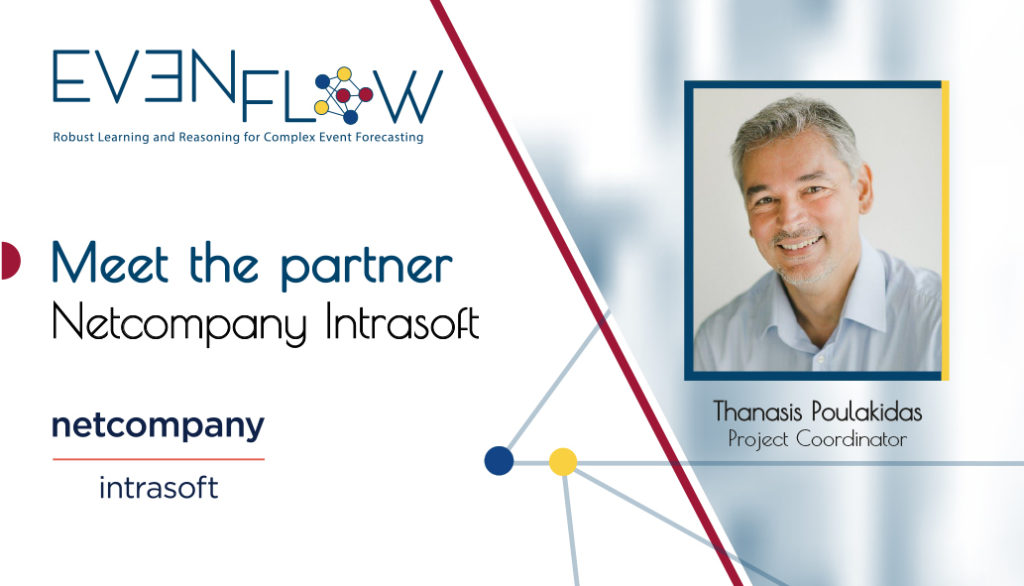
Netcompany-Intrasoft, part of Netcompany Group A/S, was established in 1996 and is a leading European IT solutions and services group, offering integrated solutions, products and IT services of the highest quality to Institutions and Agencies of the European Union, National Government Organizations, Public Agencies, Financial Institutions, Telecommunication Organizations and Private Enterprises. The company employs more than 2,800 highly skilled professionals, representing over 50 different nationalities and mastering more than 30 languages. With headquarters in Luxembourg, the company operates through its operational branches, subsidiaries, and offices in 13 countries (Belgium, Bulgaria, Cyprus, Denmark, Greece, Jordan, Kenya, Luxembourg, Romania, RSA, UK, UAE and USA) while its international activities extend to more than 70 countries worldwide.
For more than 20 years, Netcompany-Intrasoft actively contributes to the development of innovative pre-industrial products and services through its participation in EU Research Programmes. We possess a successful track record in managing large and complex collaborative research projects, implementing innovative research prototypes, and effectively communicating research results in Europe and beyond. Serving this mission, the Research and Innovation Development Department contributes to the strategic policy objective of enabling Europe to master and shape future developments in ICT, and at the same time sustaining the company’s leadership in ICT.
Role in project: Netcompany-Intrasoft is the project coordinator, covering also quality control and risk management. Netcompany-Intrasoft leads the overall architecture design and the integration in the EVENFLOW platform. The company is also responsible for data management and for delivering facilities for data handling and collection. Netcompany-Intrasoft is also in charge of the project exploitation activities.
National Centre for Scientific Research Demokritos (NCSR Demokritos)
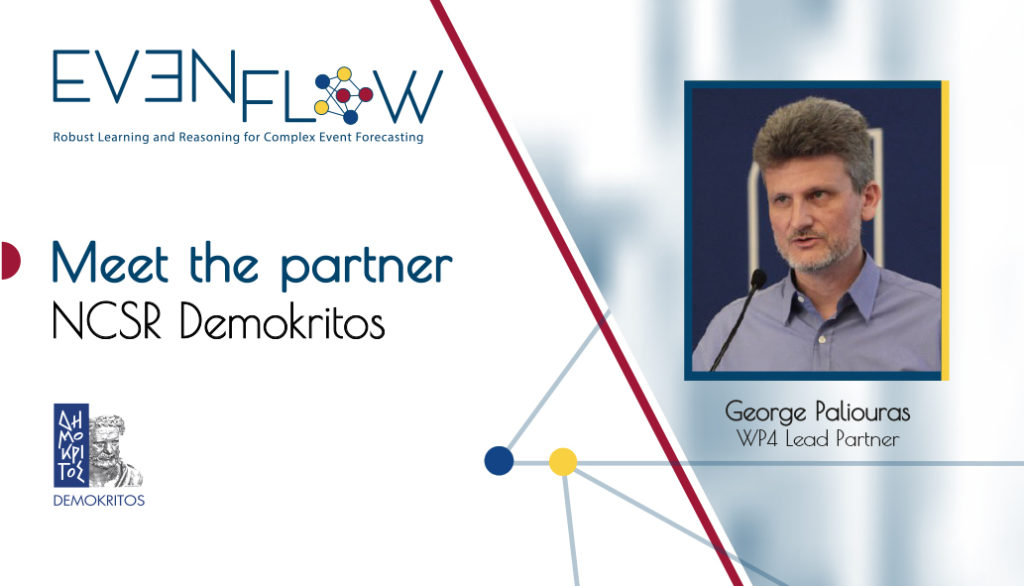
The National Centre for Scientific Research Demokritos (NCSR Demokritos) is the largest Greek self-governing research organisation under the supervision of the General Secretariat for Research and Technology (GSRT) of the Greek Government. NCSR Demokritos participates with the Software and Knowledge Engineering Lab (SKEL | The AI Lab) of the Institute of Informatics and Telecommunications.
SKEL | The AI Lab has participated in and coordinated numerous national and European projects and has substantial expertise in the areas of Artificial Intelligence, big data management, content analysis, e-infrastructures, personalisation and human-machine interaction. Since its inception, SKEL has a strong focus on Artificial Intelligence, with its research activities covering a broad range of Natural Language Processing and Content Management and Analysis areas. Its outcomes on diverse fields like Machine Learning and Knowledge Representation have been applied to critical problems in societally important sectors like Health, Culture, and Maritime.
Role in the project: NCSR Demokritos is the project’s technical manager. NCSR Demokritos’ team is responsible for the development of neuro-symbolic learning and reasoning techniques for complex event forecasting, event pattern learning and forecast explainability, and also is the leading partner of WP2 for Communication, Dissemination & Exploitation.
ATHENA – Research & Innovation Information Technologies (ARC)
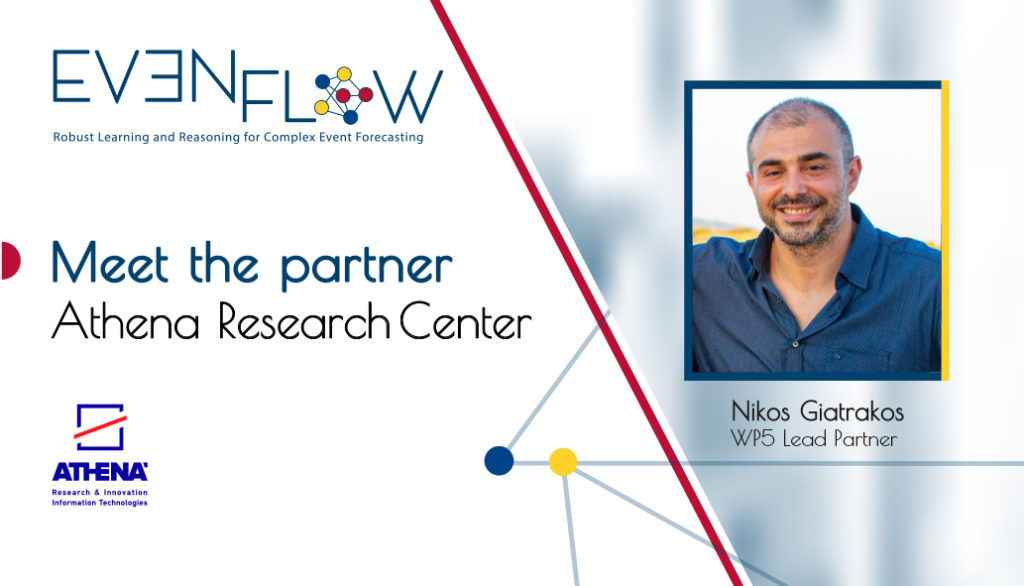
The “Athena” Research Center (ARC), founded in 2003, is the first research center in Greece with a focus exclusively on Information Society. ARC is supervised by the General Secretariat for Research and Technology of the Greek Ministry of Education and Religious Affairs. ARC participates in EVENFLOW with the Information Management Systems Institute (IMSI). IMSI was founded in 2007 with the mission to conduct research in the area of data management and large-scale information systems. The research at IMSI has a strong collaborative aspect, and ranges from basic to applied research. The collaborative aspect is expressed in that research is conducted with national and international partners from industry as well as academia, often also in the context of novel and innovative projects.
Assistant Professor Nikos Giatrakos from the Technical University of Crete is an Adjunct Researcher with ARC and the Principal Investigator from ARC’s side in EVENFLOW.
Role in the Project: As the leader of “WP5: Verification and Scalability”, ARC will develop scalable and robust neural learning algorithms for rapid, online training and prediction over data that stream in the EVENFLOW platform. Three types of scalability are taken into consideration: (i) horizontal scalability, scaling the computation with the volume and velocity of incoming data streams, (ii) vertical scalability, scaling the computation to very large numbers of processed streams, (iii) federated scalability, scaling the computation by reducing the communication among distributed computing nodes. Moreover, ARC will develop efficient maintenance techniques for neural models which change over time, accounting for both volatile statistical properties of the input streams and structural changes of the neural models themselves.
Barcelona Supercomputing Center (BSC)
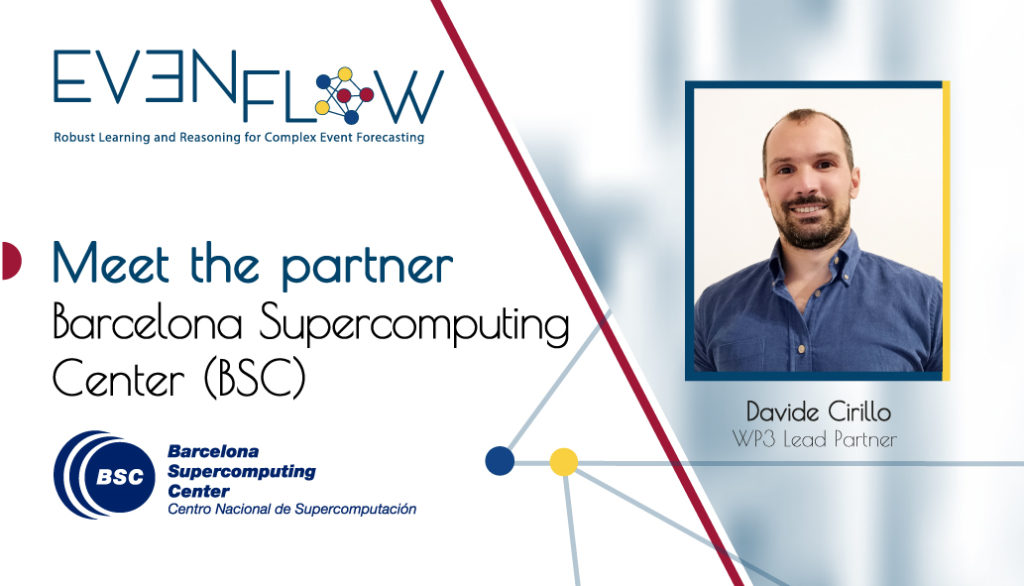
The Barcelona Supercomputing Center (BSC) is a national research and supercomputing centre in Spain, specialised in high-performance computing (HPC), that manages MareNostrum, one of the most powerful supercomputers in Europe. The BSC has successfully assembled multidisciplinary research teams to address the societal challenges, as shown by high research productivity (3rd centre in Spain to attract European funding), and the generation of significant and practical applications (involved in 14 European centre of excellence, leading 4 of them; 11 spin-offs created and 26 patents approved or pending to be approved). The centre has more than 50 groups distributed in 4 scientific departments focused on Computer Sciences, Life Sciences, Earth Sciences, and Computer Applications in Science and Engineering (CASE), supported by the Operation and Management departments, with a total staff of more than 750 R&D experts and professionals.
The Machine Learning for Biomedical Research unit, led by Dr. Davide Cirilo at the BSC Department of Life Sciences, applies machine learning to biomedical problems, generating resources and tools for biomedical research and the secondary use of data. The unit is focused on supporting projects related to machine learning that cover several application areas, including precision medicine, genomics and systems biology, counting on the use of high-performance computing and collaboration with specialised groups at BSC. The unit provides technical advice on machine learning applications for the Department and develops its own projects and collaborations within and outside BSC, such as the BSC Bioinfo4Women initiative and ELIXIR Machine Learning Focus Group.
Role in the Project: BSC is the leader of WP3, “Use-Cases and Domain Validation”. The goal of this work package is to demonstrate the EVENFLOW outcomes in the real-life scenarios provided by the project’s use cases: Industry 4.0, Personalized Medicine, and Infrastructure Life Cycle Assessment. Specifically, BSC is responsible for developing cancer progression models using representation learning in the context of the Personalized Medicine use case.
The German Research Center for Artificial Intelligence (DFKI)
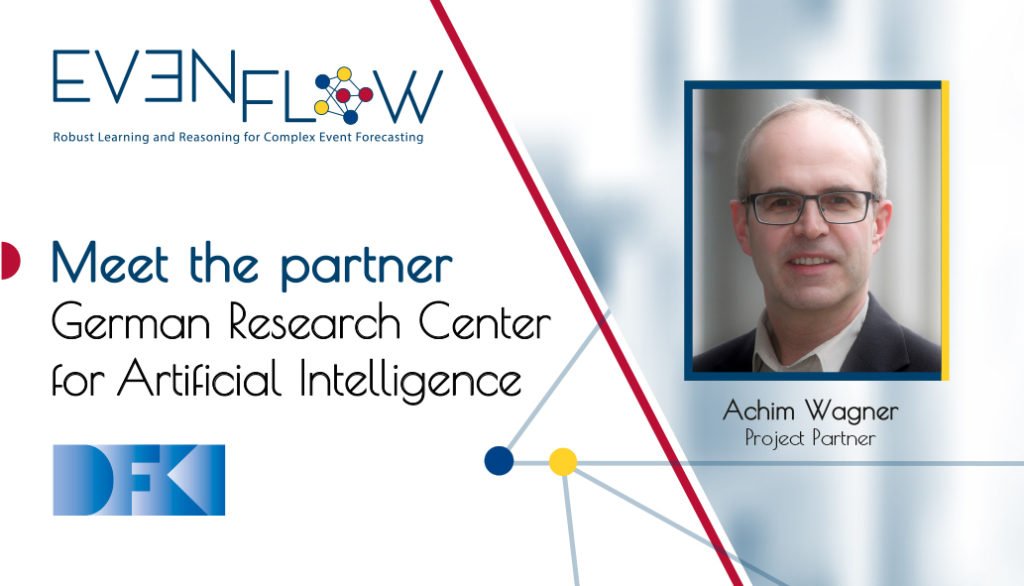
The German Research Center for Artificial Intelligence (DFKI) was founded in 1988 as a non-profit public-private partnership. It has research facilities in Kaiserslautern, Saarbrücken, Bremen and Niedersachsen, laboratories in Berlin and Darmstadt and branch offices in Lübeck and Trier. In the field of innovative commercial software technology using Artificial Intelligence, DFKI is the leading research center in Germany.
Based on application oriented basic research, DFKI develops product functions, prototypes and patentable solutions in the field of information and communication technology. Research and development projects are conducted in 27 research departments, nine competence centers and eight living labs. Funding is received from government agencies like the European Union, the Federal Ministry of Education and Research (BMBF), the Federal Ministry for Economic Affairs and Climate Action (BMWK), the German Federal States and the German Research Foundation (DFG), as well as from cooperation with industrial partners.
The research area Innovative Factory Systems (IFS) deals with topics related to the production of the future within the framework of current and planned research projects. In the scientific projects and the technical implementation, there is close cooperation with the Chair of “Machine Tools and Controls” (WSKL) at the TU Kaiserslautern and the SmartFactory KL e.V. technology initiative (SmartFactory-KL).
Prof. Martin Ruskowski and PD Dr. Achim Wagner act as a content bracket to dovetail the research projects so that they develop results-oriented, realistic solutions for skill-based shared production in the Production Level 4 ecosystem in Kaiserslautern.
Role in the project: DFKI is responsible for the Industry 4.0 Use Case. The main goal of this Use Case is to include EVENFLOWs complex event forecasting in the navigation of Autonomous Guided Vehicles (AGVs), in order to reduce unwanted events, e.g., collisions and reduce delivery time. The Use Case evaluation will take place in the DFKI SmartFactory.
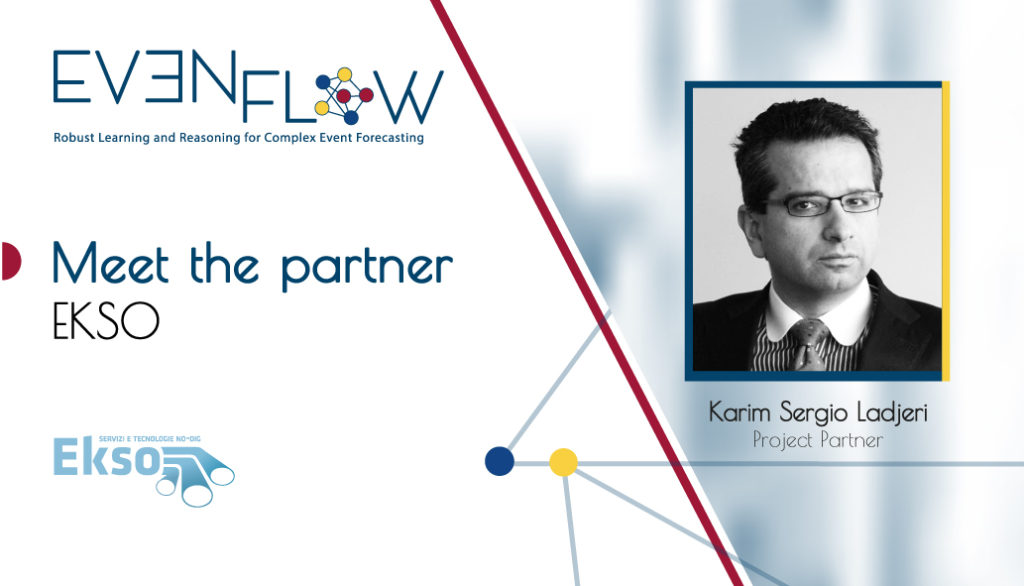
Ekso S.r.l was founded in 1998 with the aim of introducing on the Italian market, alternative solutions to the traditional systems in the field of rehabilitation and restoration of ducts, pipes and collection/transfer infrastructures, both of industrial and civil type.
Believing in the undeniable advantage of “CIPP-relining” rather than the traditional OPEN TRENCH “dig and replace” technique, Ekso acquires its know-how and develops its full potential, maximizing its advantages and results, being able, within 10 years, to become a leading company in the field of non-invasive rehabilitation technologies.
Today Ekso boasts the primacy of 500km of lines and pipelines rehabilitated through “CIPP-relining” technique, treated diameters range from 100 to 2000 mm, on circular, oval, rectangular, square shapes and sections, and on pressure and gravity pipes, made of the most various materials (steel and metals, PVC, GRP, PEAD, concrete).
Hot water, steam or UV polymerisation technique are used, depending on the context and structural and infrastructural characteristics.
Ekso is an industrial reality in continuous evolution, which invests in new and innovative technologies, in research and development of new products and training of its human resources, in order to ensure high standards of competence and professionalism.
Role in the project: Ekso will perform through a Pilot a use case that will develop a digital twin of a pipe network, which will identify and forecast LCA states and incidents ahead of time and with high accuracy. This will enable Ekso to make educated, data-driven decisions about maintenance, service, and repairs of the pipes, including the implementation of refurbishment operations when required.
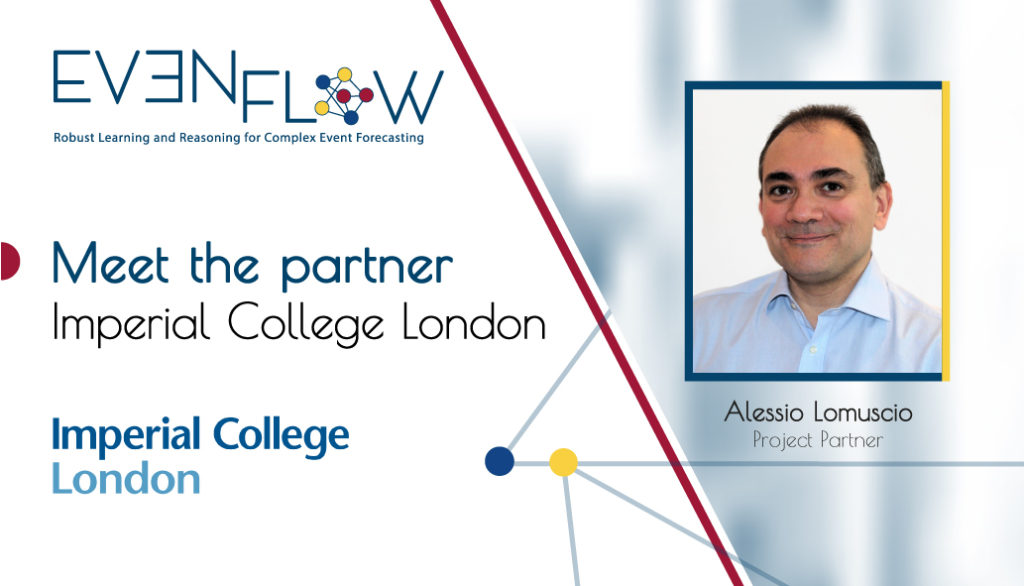
Imperial College London (ICL) participates in the project via the Verification of Autonomous Systems Lab of its Department of Computing. The lab is responsible for advances in ML verification techniques and has a long-standing record in the development of scalable methods and tools for the verification of neural networks. The group has further expertise on broader topics of AI Safety, including AI-based specification languages and logic-based verification methods for reasoning about agent-based systems.
Role in the project: The ICL team leads the tasks related to formal verification of neuro-symbolic models.


